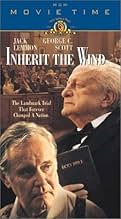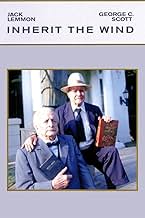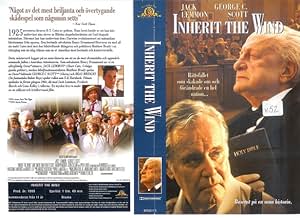CALIFICACIÓN DE IMDb
7.2/10
2.2 k
TU CALIFICACIÓN
Agrega una trama en tu idiomaBased on a real-life case in 1925, two great lawyers argue the case for and against a science teacher accused of the crime of teaching evolution.Based on a real-life case in 1925, two great lawyers argue the case for and against a science teacher accused of the crime of teaching evolution.Based on a real-life case in 1925, two great lawyers argue the case for and against a science teacher accused of the crime of teaching evolution.
- Dirección
- Guionistas
- Elenco
- Nominado a 2 premios Primetime Emmy
- 1 premio ganado y 5 nominaciones en total
Opiniones destacadas
How do you improve a great film? You don't. Showtime tried, with George C Scott and Jack Lemmon as the opponents in the 1925 Scopes Monkey trials story, but just as Kirk Douglas and Jason Robards Jr failed to so in 1988, this version doesn't come close to the brilliance of the Fredric March-Spencer Tracy version on 1960.
Scott doesn't seem to know how he wants to play Matthew Harrison Brady, the Biblical prosecutor of heavenly Hillsboro. He doesn't seem emotional at the right times. Lemmon, on the other doesn't try to be Tracy and thus his performance as Henry Drummond is more believable than Scott's. The two best performances are by Beau Bridges as EK Hornbeck and by John Cullum as the judge.
The biggest sins are committed by the secondary leads, Tom Everett Scott as Bertram Cates and Lane Smith as Reverand Brown can't find the fire displayed by Dick York, and Claude Akins in the Stanley Kramer Classic. And despite the fact that Donna Anderson was weak as Rachel Brown in the original, Kathryn Morris in this version, was weaker, in fact one can't feel any sympathy for Rachel after watching Ms Morris.
Still, it's tough to ruin a great story. Inherit The Wind is a classic that is successful despite subpar acting and a directing job that virtually duplicates Stanley Kramer's film, scene for scene.
The question is, why bother?
Scott doesn't seem to know how he wants to play Matthew Harrison Brady, the Biblical prosecutor of heavenly Hillsboro. He doesn't seem emotional at the right times. Lemmon, on the other doesn't try to be Tracy and thus his performance as Henry Drummond is more believable than Scott's. The two best performances are by Beau Bridges as EK Hornbeck and by John Cullum as the judge.
The biggest sins are committed by the secondary leads, Tom Everett Scott as Bertram Cates and Lane Smith as Reverand Brown can't find the fire displayed by Dick York, and Claude Akins in the Stanley Kramer Classic. And despite the fact that Donna Anderson was weak as Rachel Brown in the original, Kathryn Morris in this version, was weaker, in fact one can't feel any sympathy for Rachel after watching Ms Morris.
Still, it's tough to ruin a great story. Inherit The Wind is a classic that is successful despite subpar acting and a directing job that virtually duplicates Stanley Kramer's film, scene for scene.
The question is, why bother?
This film is a remake of a 1960 movie about the 'Scopes' monkey trial in July of 1925, argued by prominent statesman William Jennings Bryan (for the prosecution and the Bible) and equally the prominent Clarence Darrow (for the defense, scientific thought and Darwin). Rather than compare it with the original, which I understand was brilliant, I will evaluate it on its own.
This is a powerful and thought provoking courtroom drama about a school teacher who was arrested for teaching evolution, then considered a heresy against God and the bible. The topic is unfortunately as timely today as it was 75 years ago. The film is extremely effective at illustrating the pervasive ignorance and fear so prevalent in fundamentalist religions. It depicts with great clarity, the frenzied and irrational efforts undertaken to suppress any knowledge that threatens to debunk the myth and simple minded traditions that bind the faithful together.
Unfortunately, the presentation of the story had certain flaws that kept it from being a truly great film. My biggest objections are all directorial. First, this film was visually mediocre and pedestrian. The camera basically followed the speaker around the room at the same angles from pretty much the same distances. There were very few reaction shots which would have greatly enhanced the drama. I don't think there was a single reaction shot of any member of the jury and only a couple from the gallery.
Director Daniel Petrie takes enormous artistic license in presenting the trial. The way it was portrayed it seemed more like an unmoderated debate between the lawyers than a criminal trial with rules of court. Granted, it was a small town in 1925, but this was ridiculous. In real trials, lawyers have two opportunities to give speeches in a trial, in opening and closing statements. During the trial itself, they are only to ask questions and gather evidence under very strict rules. They can't give speeches or lead the witness or inject their opinion about a witness' testimony. This was flouted in the film as lawyers violated these rules repeatedly with nary an objection from the other side. Ironically, the most important speeches of the trial, closing arguments were completely missing from the film.
I found Jack Lemon's portrayal of defense lawyer Henry Drummond to be disturbingly restrained. Lemon is clearly capable of unfettered rage and indignation, yet he played his character with resignation and defeatism rather than frustration and wrath. He simply didn't fight hard enough for the principles in which he supposedly believed. I blame this on Petrie.
Without question, the performance of the film belonged to George C. Scott in his last performance before his death (a stunning coincidence since William Jennings Bryan, on whom Scott's character is based, died shortly after this trial. So it was his last performance as well). Scott is magnificent as the bible thumping prosecutor rattling the rafters of the little courthouse with his booming gravel voice. This was the type of part Scott was born to play and it may have been his best performance since Patton. For this reason alone this film should be on every film buff's list. If only Lemon brought similar fire to his part, this film would have been riveting.
Beau Bridges was a bit overly obnoxious as the sardonic reporter E.K. Hornbeck. The role called for a good deal of cynicism, but Bridges got carried away.
Lane Smith gives a terrific performance as the Lord possessed Reverend Brown, who damns his own daughter to hell for refusing to renounce her love for her fiance Cates, the accused school teacher. His sermon at the prayer meeting was more than worthy of any cable TV evangelist.
I gave this film a 7/10. I think it would be rated higher by most people who think of a courtroom as more of a dramatic setting than place of justice. Overall it is a credible update of a topic that should remain in the forefront of our minds if we hope to continue living in a free and rational society.
This is a powerful and thought provoking courtroom drama about a school teacher who was arrested for teaching evolution, then considered a heresy against God and the bible. The topic is unfortunately as timely today as it was 75 years ago. The film is extremely effective at illustrating the pervasive ignorance and fear so prevalent in fundamentalist religions. It depicts with great clarity, the frenzied and irrational efforts undertaken to suppress any knowledge that threatens to debunk the myth and simple minded traditions that bind the faithful together.
Unfortunately, the presentation of the story had certain flaws that kept it from being a truly great film. My biggest objections are all directorial. First, this film was visually mediocre and pedestrian. The camera basically followed the speaker around the room at the same angles from pretty much the same distances. There were very few reaction shots which would have greatly enhanced the drama. I don't think there was a single reaction shot of any member of the jury and only a couple from the gallery.
Director Daniel Petrie takes enormous artistic license in presenting the trial. The way it was portrayed it seemed more like an unmoderated debate between the lawyers than a criminal trial with rules of court. Granted, it was a small town in 1925, but this was ridiculous. In real trials, lawyers have two opportunities to give speeches in a trial, in opening and closing statements. During the trial itself, they are only to ask questions and gather evidence under very strict rules. They can't give speeches or lead the witness or inject their opinion about a witness' testimony. This was flouted in the film as lawyers violated these rules repeatedly with nary an objection from the other side. Ironically, the most important speeches of the trial, closing arguments were completely missing from the film.
I found Jack Lemon's portrayal of defense lawyer Henry Drummond to be disturbingly restrained. Lemon is clearly capable of unfettered rage and indignation, yet he played his character with resignation and defeatism rather than frustration and wrath. He simply didn't fight hard enough for the principles in which he supposedly believed. I blame this on Petrie.
Without question, the performance of the film belonged to George C. Scott in his last performance before his death (a stunning coincidence since William Jennings Bryan, on whom Scott's character is based, died shortly after this trial. So it was his last performance as well). Scott is magnificent as the bible thumping prosecutor rattling the rafters of the little courthouse with his booming gravel voice. This was the type of part Scott was born to play and it may have been his best performance since Patton. For this reason alone this film should be on every film buff's list. If only Lemon brought similar fire to his part, this film would have been riveting.
Beau Bridges was a bit overly obnoxious as the sardonic reporter E.K. Hornbeck. The role called for a good deal of cynicism, but Bridges got carried away.
Lane Smith gives a terrific performance as the Lord possessed Reverend Brown, who damns his own daughter to hell for refusing to renounce her love for her fiance Cates, the accused school teacher. His sermon at the prayer meeting was more than worthy of any cable TV evangelist.
I gave this film a 7/10. I think it would be rated higher by most people who think of a courtroom as more of a dramatic setting than place of justice. Overall it is a credible update of a topic that should remain in the forefront of our minds if we hope to continue living in a free and rational society.
The movie epitomizes what civilized debate can and should be. There are scintillating performances from Lemmon and Scott, and some very quotable lines as well. The courtroom atmosphere is well created and tension is never allowed to slack. Perhaps the most eloquent testimony paid on screen from a protagonist to his antagonist comes in the closing scenes. Although it is supposed to be based on the Scopes Monkey Trial, the closing credits state that the movie is a work of fiction. The movie raises many questions about the longstanding impasse between religion and science, between faith and reason. In a strange way, it does not conclusively resolve these issues but rather allows the viewer to decide for herself or himself. It will echo in your mind long after you have viewed it. Heartily recommended.
I am sad that these two great actors are no longer with us. They both gave so much to us via Hollywood. This movie is one of many productions where their talent shined.
Inherit the Wind -1999- is about a teacher who was tried for teaching evolution back in 1925. The writers and director portrayed both men as honorable, intelligent members of society who simply had a different viewpoint. Unlike movies like Runaway Jury -2003- which demonized the firearm industry, and portrayed the other side as kind and caring. This film, Inherit the Wind, handled both sides of the Evolution debate seriously. Runaway Jury for example, had a jury member initiate the pledge of allegiance in court. A silly stunt that took the credibility of the movie away.
I highly recommend this film for the whole family and teachers should show this film for their students to watch. I am sure the discussions afterwards should be quite interesting.
--shutterbug--
Inherit the Wind -1999- is about a teacher who was tried for teaching evolution back in 1925. The writers and director portrayed both men as honorable, intelligent members of society who simply had a different viewpoint. Unlike movies like Runaway Jury -2003- which demonized the firearm industry, and portrayed the other side as kind and caring. This film, Inherit the Wind, handled both sides of the Evolution debate seriously. Runaway Jury for example, had a jury member initiate the pledge of allegiance in court. A silly stunt that took the credibility of the movie away.
I highly recommend this film for the whole family and teachers should show this film for their students to watch. I am sure the discussions afterwards should be quite interesting.
--shutterbug--
The Showtime cable channel has scored another success here. Recently Showtime gave us Jack Lemmon and George C. Scott in a remake of 12 ANGRY MEN, and now we have these two excellent actors in the remake of INHERIT THE WIND.
The fictionalized retelling of the famous "Monkey Trial" is an interesting study in what is still with us -- the struggle between literal interpretation of the Bible and secular science. The point that INHERIT THE WIND makes is that there may be no contradiction between science and religion -- but that by looking at the letter and not the spirit of religion, we create divisions for ourselves and will eventually inherit the wind. In other words, we will inherit nothing but talk.
The cast is excellent. This is a worthy successor to the powerful 1960 film.
The fictionalized retelling of the famous "Monkey Trial" is an interesting study in what is still with us -- the struggle between literal interpretation of the Bible and secular science. The point that INHERIT THE WIND makes is that there may be no contradiction between science and religion -- but that by looking at the letter and not the spirit of religion, we create divisions for ourselves and will eventually inherit the wind. In other words, we will inherit nothing but talk.
The cast is excellent. This is a worthy successor to the powerful 1960 film.
¿Sabías que…?
- TriviaAccording to Piper Laurie, both Jack Lemmon and George C. Scott were in poor health during filming. However, she claimed that while Lemmon frequently forgot his lines, Scott despite being very weak and tired never forgot his.
- Citas
Henry Drummond: He that troubleth his own house shall inherit the wind and the fool shall be servant to the wise in heart.
- ConexionesFeatured in The 51st Annual Primetime Emmy Awards (1999)
- Bandas sonoras(Gimme Dat) Old Time Religion
(uncredited)
Traditional spiritual
Sung by the Townfolks
Selecciones populares
Inicia sesión para calificar y agrega a la lista de videos para obtener recomendaciones personalizadas
Detalles
- Fecha de lanzamiento
- País de origen
- Idioma
- También se conoce como
- Heredarás el viento
- Locaciones de filmación
- Productoras
- Ver más créditos de la compañía en IMDbPro
- Tiempo de ejecución1 hora 53 minutos
- Color
- Mezcla de sonido
- Relación de aspecto
- 1.33 : 1
Contribuir a esta página
Sugiere una edición o agrega el contenido que falta

Principales brechas de datos
By what name was Inherit the Wind (1999) officially released in Canada in English?
Responda

































